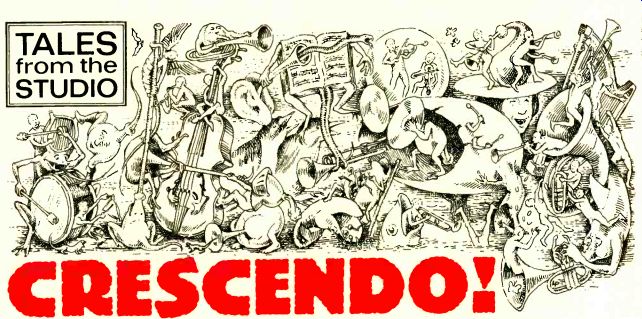 .
.
Even discord can be, in its own way, sweet.
by JACK SOMER
IT'S a crisp March afternoon in 1963. The quarter-acre floor of New York's gaudy Webster Hall is all but covered by a parcel of musicians amid a dense forest of microphone booms.
Marty Gold--arranger, conductor, woodland sprite--is standing before the orchestra, dwarfed by its immensity.
There is an unusual tension in the hall. We are recording a souped-up Sound-Spectacular album, "Sounds Unlimited," designed to exploit RCA's then-new Dynagroove process, so we're being overly fussy with the orchestra setup and we're pushing the musicians hard. The tension is telling: they've recorded the first number, Ballerina, six times, and the playing has been lifeless all six.
Marty and I confer during a break, sharing our concern. It's agreed that we're in trouble if things don't loosen up, so I suggest we do a few quick takes uninterrupted by microphone changes and chair shifts. He returns to the podium, and I slate Take Seven. A brief silence, then Marty's voice:
"Ready ... a-one, a-two, a-three ...," then five trumpets, five trombones, two French horns, tuba, and tympani bring forth the stunning opening fan fare. The sound is glorious, Olympian-until the peak measure, when the lead trumpeter, one of the best in the business, blares an incomparably sour note.
Spontaneously, without losing a beat, the rest of the men answer his blatant clinker with instrumental catcalls, Bronx cheers, razzes, riffs, and trills in every conceivable key, building to a clashing, lunatic crescendo until the very hall resounds. Through the din, I hear the racetrack bugle call answered by a piercing whinny. A trombone is wetly bellowing Beethoven's Fifth, the fiddles are meowing like love-sick cats, cymbals are crashing, strange melodies are belching brazenly from the horns, and the whole dissonant symphony is accompanied by the rustle of tissues and the clatter of coins flying through the air in every direction.
This is no fanfare; it's a rout. It's Hell's Hallelujah Chorus. It's Brueghel set to music. It's Hieronymus Bosch and his Orchestra of Worldly Delights.
It hisses, jangles, and roars, and in twenty seconds it rises, explodes, and fizzles to nothing ... but laughter. Laughter so rich and musical it rivals Berlioz. Laughter so harmonious it ought to be re corded. Recorded! "Did we get that on tape?" I gasp to the engineer.
He is slumped over the console, convulsed, but he is able to raise one shaking hand to give me the O.K. sign.
It takes a minute for everyone to recover his breath and composure, another for the drying of some ninety tear-filled eyes. But the musicians are smiling and loose now. With congratulations for their brilliant, if short, performance, I ask them for another take. The fanfare is perfect, the orchestra inspired, the tension gone. In two minutes and forty-five seconds Ballerina is "in the can." The rest of the session runs so smoothly that we finish a half hour early, but the men remain to crowd the tiny control room to hear post-session play backs. We open a bottle of Scotch, pass out the paper cups, and drink to Euterpe and Thalia.
----------
Also see:
THE BASIC REPERTOIRE--Haydn's Trumpet Concerto. MARTIN BOOKSPAN
Link |
DIONNE WARWICKE--Still working hard on her second career. ROBERT WINDELER